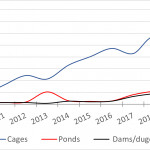Policy workshop on introducing and managing exotic fish strains in Ghana’s aquaculture sector. Ghana’s rapidly growing aquaculture production (Figure 1) has made the country the second-largest tilapia producer in Africa. Several factors account for this growth—including the introduction of the improved Akosombo strain, government interventions, new local feed production companies, and increasing local demand—but […] Source: IFPRI Ghana
Impact of fish feed formulation training on feed use and farmers’ income: Evidence from Ghana
Feed accounts for 60–80% of tilapia production costs, and high feed cost and limited feed access are major issues faced by fish farmers. A potential solution is for farmers to produce their own feeds using cheaper and locally available ingredients. This paper evaluates the feed formulation training implemented in Ghana as part of the Fisheries […] Source: IFPRI Ghana
Characterization of fish farming practices and performance: Baseline study and implications for accelerating aquaculture development in Ghana
Over the past decade, the aquaculture sector in Ghana has experienced tremendous growth—driven mainly by large-scale cage farms—but it has been unclear how the rural poor have shared in this growth. A research project conducted has been initiated to help diagnose, design, and test interventions for better inclusion of the rural poor, women, and youth […] Source: IFPRI Ghana
Fish farming pulls 20 lakh out of poverty: study
More than 20 lakh of the 1.80 crore Bangladeshis who escaped poverty between 2000 and 2010 managed to do so because of aquaculture, said International Food Policy Research Institute (IFPRI), raising the need for the government to give this area of agri... Source: IFPRI Bangladesh Country Office

